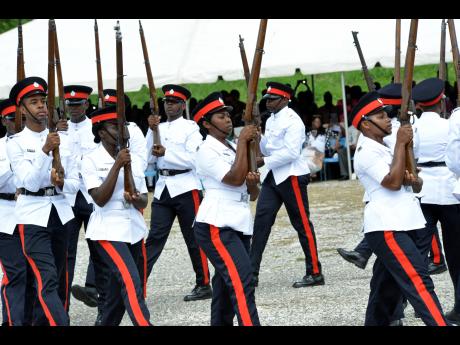Police makeover closer - Draft legislation proposes significant changes to JCF
No more oaths to the Queen, a focus on community policing, and a new authority to monitor their performances are some of the changes proposed in the latest draft of legislation to rebrand the Jamaica Constabulary Force (JCF).
The draft document, seen by The Sunday Gleaner, also proposes more powers for the police, the provision of legal fees by the State for members of the force charged in the execution of their duties, including pre-charge legal fees and the expansion of the duties of the cops.
But there is no mention of a new use of force policy, the Mobile Reserve or the creation of special squads in the force.
The JCF is to be rebranded next year, having missed the November 2017 deadline which was announced by Prime Minister Andrew Holness in May, but there is still no agreement on what will be its new name.
The draft proposes that the JCF be renamed the National Public Service of Jamaica or the Police Service of Jamaica.
In its broad statement, the draft says the legislation is intended "to ensure that the people of Jamaica have a police service that is responsive to their needs by embracing a community policing philosophy, which recognises the value of partnership and policing with the consent of the people".
The rank and structure of the force will remain almost unchanged, but the new legislation will establish key civilian posts, including a principal finance officer and a director of corporate communications.
Under the proposed legislation, constables will no longer swear an oath to "Our Sovereign Lady the Queen," or "see and cause Her Majesty's peace to be kept". Instead, they will swear an oath to "the people of Jamaica".
The proposed legislation makes provisions for the establishment of a powerful Police Authority, which will be mandated to monitor the performance of the cops, demand annual reports from the commissioner and agree on targets in the policing plan.
The duties and powers of the cops are also to be widened, with ability to arrest without warrant persons involved in aggressive begging, aggressive vending, loitering and intimidation of individuals. This is designed to allow the police to curb street crimes such as loader men at bus parks and windshield wipers.
The cops are also to be granted the authority to give suspects "conditional release". "This is to be similar to pre-charge bail as practised in the United Kingdom where instead of detaining in some cases, the police may arrest and grant release or bail prior to formal charge," the draft says.
The draft legislation also proposes that promotional arrangements should reflect a transparent and merit-based system of advancement while members of the new service will be required to satisfy prerequisites as outlined in a new 'Promotion Policy' of the Service or the Regulations.
It is also proposed that minimum standards for police facilities be established, but these are to be outlined in the regulations which will follow the passing of the legislation.
Powers of the police
Retain the current powers under the Constabulary Force Act, which include:
- Power to arrest without warrant any person found committing any offence (Section 15)
- Power of arrest under warrant (Section 16)
- Powers for searching persons on board any ship or boat (Section 17)
- Powers to apprehend without warrant with respect to dangerous drugs or illegal gambling (Section 18)
- Powers to stop and search vehicles with respect to stolen goods, dangerous drugs or illegal gambling (Section 19)
Proposed new powers:
- Power to stop and search any person or vehicle in the course of a roadblock or checkpoint in order to restore public order or to ensure public safety (with written authorisation)
- Power to search for weapons of crime during the course of an investigation.
- Power to erect or place barriers in or across any road or street or in any public place for the maintenance and preservation of law and order or for the prevention or detection of any offence.
- Power to bear arms and use force.
- Power to grant Conditional Release (similar to pre-charge bail as practised in the UK). Example, instead of detaining in some cases, the police may arrest and grant conditional release or bail prior to formal charge. The conditions must be within a stipulated timeline and may include periodic reporting for effective monitoring. Conditional release must be authorised.
- Power to arrest without warrant with respect to aggressive begging, aggressive vending, loitering and intimidation of individuals. (to assist in curbing street crimes such as loader men at transport centres, windshield wipers, etc.)
- Powers to issue notices, tickets, and/or summonses with respect to issues relating to public safety, social disorder or blight.

